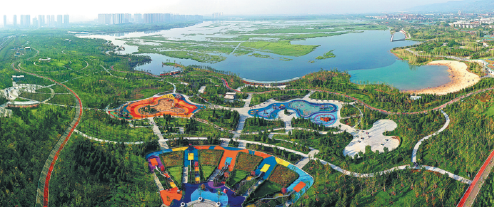
A panoramic view of Jinyang Lake, as well as its surroundings, in Taiyuan, Shanxi province. [Photo by Han Shuangxi for China Daily]
When returning to his home city of Taiyuan during the New Year holiday, Li Jun, a Shanxi native who has been living outside the province for 20 years, said Taiyuan is a city in midst of a transformation.
"I could sense the changes every time I returned to Taiyuan," Li said. "And they were always changes for the better."
Huang Tao, a resident of Taiyuan, has a deeper understanding of the city's transformation.
"The environment has become better, the economy is improving steadily and residents can enjoy better opportunities in employment and business," Huang said. "I'm proud to be a Taiyuan resident."
In 2021, Taiyuan's GDP reached 512.16 billion yuan ($74.37 billion), surpassing 500 billion yuan for the first time. The year-on-year growth rate was 9.2 percent, ranking third among provincial capital cities on the Chinese mainland, according to the Taiyuan bureau of statistics.
Its GDP increase was 3.5 percent in the first half of 2022, 1 percentage point higher than the national average.
Apart from the impressive figures, what makes Taiyuan residents proud of the city's growth is its high-quality development featuring economic diversification and a better environment.
The high-quality development is a result of Taiyuan's industrial transformation that aims to reduce its reliance on the coal industry and cultivate emerging industries as new drivers for growth, local officials and experts said.
According to Guo Shufen, dean of the School of Public Administration at Shanxi University of Finance and Economics, Taiyuan's economy used to be dominated by the coal industry.
"In the past, the coal industry accounted for more than 50 percent of Taiyuan's economy," Guo said.
She said the heavy reliance on coal and related heavy industries had led to the deterioration of the environment and the city's lack of competitiveness in the era of new industrialization.
Taiyuan began to implement an economic transformation campaign in the early 2000s.
In 2010, the coal-related industries accounted for about 31 percent of the industrial added value of Taiyuan. In 2021, the ratio was reduced to 12.5 percent.
An Xiangsheng, a professor at the School of Economics and Management at Taiyuan Normal University, said using new technologies to upgrade traditional industries like coal mining and fostering emerging industries as new growth areas are the prominent features of Taiyuan's economic transformation.
About 50 kilometers from the center of Taiyuan, Malan Coal Mine, a subsidiary of Shanxi Coking Coal Group, is an example of intelligent coal mining in the city.
Malan has basically realized digital and automatic underground operations with 32 base stations, a 5G wireless network reaching a depth of 200 meters in the mining shafts and a full range of automatic coal-cutting and conveying machines.
"The new technologies make unmanned underground mining possible," said Su Guoqiang, an executive at the coal mine. "That ensured greater safety, higher efficiency and better environmental benefits."
In an industrial park in Taiyuan's Qingxu county, a pipeline system has taken the place of trucks to transport coal, reducing the emission of dust to a minimum.
Also in the park, Meijin Group is using coking gas to produce hydrogen, maximizing the use of resources and greatly reducing air pollution at its coking plants.
The Shanxi Transformation and Comprehensive Reform Demonstration Zone in the south of Taiyuan has played an important role in assisting the city's industrial transformation.
The zone is now a major destination for emerging industries in Taiyuan, with a focus on advanced manufacturing, high technology and new materials industries.
As one of the fastest-growing development zones in China, it ranked 37th among all the national-level development zones last year, compared with the 99th place in 2018. Its GDP grew from 42.1 billion yuan in 2017 to 86.15 billion yuan last year, according to local officials.
Guo Yanjie contributed to this story.
